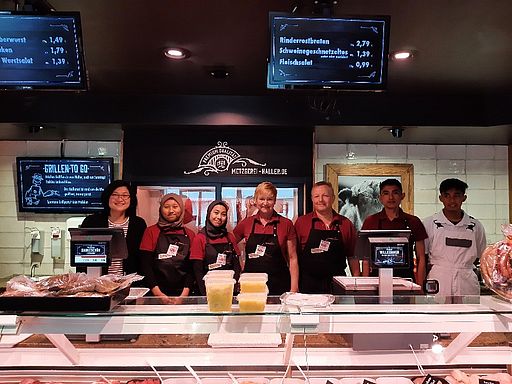Real-life example: From Indonesia to the Black Forest – a family business reports
Correct as of 23 October 2024
Due to a shortage of skilled workers, Werner Schmidt has only been able to take on one new apprentice in the past five years at his rural-style Haller delicatessen and butcher’s shop in the Black Forest. Due to a lack of applications, he took the plunge and recruited four motivated apprentices from Indonesia. Wirtschaftsförderung Schwarzwald-Baar-Heuberg (Wifög) provided valuable support throughout the process and continues to do so. In this interview, Werner Schmidt talks about how happy he is with his new apprentices and how their integration has opened up new prospects for him.
How did you manage to integrate your apprentices from Indonesia?

Werner Schmidt: We are a family business with 35 employees and a very regional focus. Recruiting people directly from abroad and integrating them into the business was new territory for us and we didn’t know exactly what to expect. We were looking for new talent and initially turned to placement agencies, but this did not work for us.
At some point, my daughter came across Wirtschaftsförderung Schwarzwald-Baar-Heuberg (Wifög). This business development agency helped us not only with the recruitment, but also with the preparation of the four trainees for their move to Germany and their integration here. Wifög organised German language courses in the country of origin, took care of visa and entry formalities and found an apartment for them here in Villingen-Schwenningen. The two young men and two young women now live there as a group.
Although the four Indonesian apprentices spoke quite good German when they arrived and were able to communicate, they are currently attending a German course at the adult education centre (Volkshochschule) to further develop their language skills. Thanks to a support programme, they do not have to pay for this.
And the trainees are already getting good grades at vocational school. We are confident that all four will be successful in their apprenticeships.
Tip
Are you looking for an advisory service in your area? In our database you can find advisory services providing support on topics such as international recruitment, integration or language acquisition.
Were there any things that surprised you?
Werner Schmidt: At first I was sceptical about whether it would all work. All four of them are Muslim and don’t eat pork, so they’re selling our products that they don’t eat themselves. But they do a very good job, are willing to learn, are very punctual and have never been off sick.
The other employees and customers have all been very positive. Society seems to have understood that in many industries recruitment from abroad is now the only solution.
What challenges did you face in integrating your apprentices and how did you overcome them?
Werner Schmidt: Transport was probably the biggest challenge. Since the four trainees are spread across our four branches in the region, they were reliant on buses and trains. In the first few weeks it wasn’t easy for them to get on the right bus, buy the right ticket and read the timetables. We underestimated it a bit because we don’t use public transport ourselves. But now they are really good at it and use buses and trains to get around.
Despite taking German classes, our apprentices still have a lot to learn about the different types of meat and sausage. But they have come up with their own creative ways of learning. For example, they use their mobile phones to take photos of our counter and then edit them at home, adding the correct names to all the products. They’re really hardworking, we didn’t expect that.
What advice would you give to other SMEs on integrating skilled foreign workers?
Werner Schmidt: My main advice is for small businesses in particular to find out about the support services available early on and to make active use of them! We wouldn’t have been able to do it all without the business development agency. To this day, Wifög staff regularly check in on the four trainees and we are in good contact with them.
It was also very helpful to recruit a small group, rather than just individuals. This helped to alleviate some of the homesickness and the four were also able to support each other. We also discussed our expectations of each other beforehand. The way things are going, I can well imagine taking the four on after they have successfully completed their training; the apprentices have also expressed an interest in staying in Germany in the long term.
We are delighted that things have gone so well so far. It was the right decision to train people ourselves, at least in our trade, because in many countries there is no vocational qualification for selling meat and sausage products. I am even considering taking on two Indian apprentices for next year. In that case, I would also provide accommodation – you have to think about such things beforehand.
Many thanks to Mr Schmidt for the interview!
In the spotlight
Establishing successful integration management – a practical guide
Guest article
Real-life example: Professional integration management on equal terms
Do you have any questions?
Let us advise you on your opportunities to work and live in Germany. Our experts will support you with questions regarding job search, visa, recognition and learning German.
You can find out more about the various contact options by clicking on one of the icons in the bar below.
